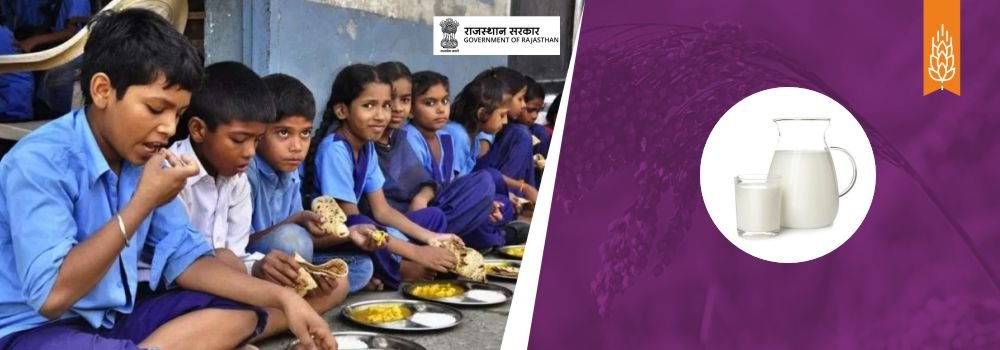
The BJP government in Rajasthan is preparing to implement a major overhaul of a program that was established by the previous Congress administration. The planned change involves replacing the milk component of school meals with coarse grains, such as millets.
Education Minister Madan Dilawar has underscored the shortcomings of the Bal Gopal Yojana, a program that was intended to provide milk to schoolchildren as part of their midday meals. Despite the program’s goal to enhance student nutrition, it has not been successful in reaching all students equally. Issues have included inconsistent distribution and varying levels of student acceptance. To remedy these problems and improve the effectiveness of school meals, the Education Department is now considering substituting milk with millets.
Minister Dilawar has pointed out several challenges associated with the current use of powdered milk. Many students find powdered milk unappealing, which undermines the program’s success. Additionally, logistical difficulties make it challenging to provide high-quality cow milk to all schools. These challenges include the cost of procurement, storage, and transportation. As a result, the government is exploring millets as a viable alternative. Millets are not only cost-effective and easier to distribute but also offer significant nutritional benefits. They are a rich source of essential nutrients and can be a more suitable option for school meals.
By transitioning to millets, the government aims to provide a more universally accepted and nutritious food option, ensuring that all students benefit from a balanced diet. This change reflects a broader effort to improve the efficiency and impact of school meal programs, addressing both nutritional needs and practical challenges.
Meta Title: Rajasthan Government to Replace Milk with Millets in School Meals
Meta Description: The BJP government in Rajasthan plans to overhaul the Bal Gopal Yojana by replacing milk with millets in school meals. Education Minister Madan Dilawar cites issues with powdered milk and distribution challenges as reasons for this change, aiming to provide a more nutritious and accepted food option for students.
Meta Tags: Rajasthan, BJP Government, Bal Gopal Yojana, School Meals, Millets, Nutrition, Education Minister Madan Dilawar, Coarse Grains, Student Nutrition, Milk Replacement, Midday Meals, School Nutrition Programs
To address the challenges faced by farmers in the region, the Centre must take decisive and proactive steps. This involves close collaboration with the two state governments, sharing the financial responsibilities either equally or in a 60:40 ratio. Such a coordinated effort could significantly benefit farmers, offering them new opportunities and a chance for a fresh start.
Shivraj Singh Chouhan, a prominent leader, has the potential to play a pivotal role in this initiative. His leadership could be instrumental in fostering trust and improving relationships between the government and the farming community. Building this trust is essential for the success of any new program, as it ensures that farmers are more likely to engage with and support the changes being proposed.
Recently, the Centre and the Punjab government introduced a new program designed to help farmers transition from paddy cultivation to growing alternative crops. This program aims to address the issues of water overuse by encouraging farmers to switch to crops that require less water during the kharif season, which runs from June to September.
Under this scheme, farmers are offered a financial incentive of Rs 17,500 per hectare to make the switch. The program covers up to five hectares per farmer, which allows them to adopt new, more sustainable farming practices. The funding for this initiative is shared between the Centre and the Punjab government in a 60:40 ratio, with an estimated total expenditure of Rs 289.87 crore for the fiscal year 2024-25.
This initiative represents a significant step toward promoting sustainable agriculture in Punjab by reducing the dependency on water-intensive paddy cultivation. However, while this program is a promising start, achieving long-term success will require ongoing efforts. This includes ensuring that farmers receive adequate resources, support, and training to effectively transition to new crops. Continuous support will help farmers manage the shift, overcome any challenges, and make the most of the new opportunities provided by the program.
© 2023 - 2026 Millets News. All rights reserved.